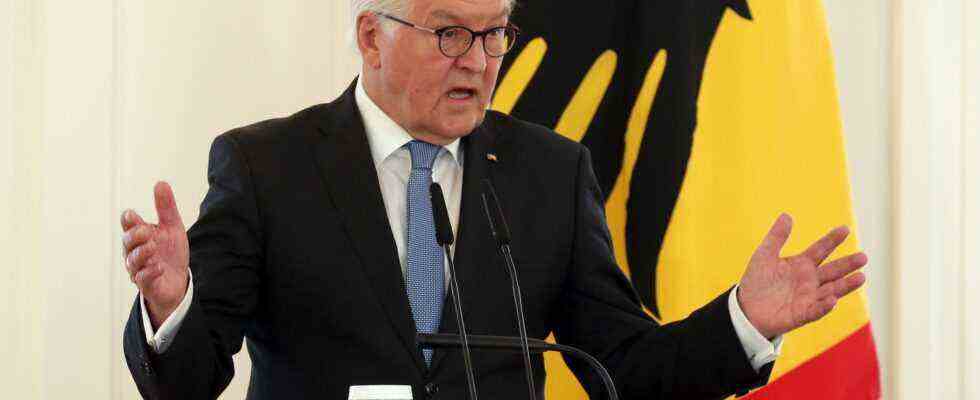portrait
Status: 02/12/2022 09:28 a.m
President Steinmeier is to be re-elected tomorrow for a second term. His first term of office was marked by crises, conflicts and Corona. The former party politician found his topic.
“A man of the political center,” was how German Chancellor Angela Merkel once praised him. That was in autumn 2016 when the CDU and CSU decided not to put up their own candidates.
Instead, they supported Frank-Walter Steinmeier, then Foreign Minister and SPD member, for the office of Federal President. A “signal of stability” in times of instability, emphasized Merkel. She probably had no idea how much Steinmeier would be in demand.
The search for the topic
In February 2017, Steinmeier took over from his non-party predecessor Joachim Gauck. He had dedicated himself to the topic of “freedom”. And now many were wondering what Steinmeier would focus on, what accents he would set. In his first speech after the Federal Assembly elected him President, he said: “Freedom and democracy in a united Europe” are the foundations that Germany must defend. Steinmeier was convinced that it was “not invulnerable” but strong.
What was still echoing between the lines at the time became Steinmeier’s message over time. Trump in the US, the AfD in Germany, populist governments in Poland and Hungary – all of this shaped Steinmeier’s tenure, says Andrea Römmele, political scientist and professor at the Hertie School: “That democracy is not self-evident, that everyone is fighting for it and making their contribution have to do, that’s Steinmeier’s big issue.”
Bridge builders – politically and socially
In practical terms, Steinmeier’s role as a mediator was in demand right from the start of his term. After the government negotiations between the Union, FDP and Greens failed in autumn 2017 and the SPD had already committed itself to the opposition role, the debate revolved around the question of a minority government or new elections. Steinmeier, on the other hand, appealed to the parties: “Anyone who is running for political responsibility in elections must not duck when you hold it in your hands.”
Steinmeier invited everyone involved, whom he knew well from his active time in the cabinet, to Bellevue Palace and appealed to the conscience of the SPD in particular. With success: In February 2018, stability was restored with another grand coalition. “He was the great bridge builder between the Union and the SPD,” says Römmele. “This role suits Steinmeier, also socially.”
In order to build bridges, Steinmeier repeatedly sought dialogue, often on a smaller scale. He regularly invited people of different opinions and backgrounds to his “coffee table”. In the corona pandemic, there were digital formats, Steinmeier spoke to opponents of vaccination, teachers or medical staff. Many discussions were broadcast live on the Internet. The Federal President also tried to reach more people on social networks, for example via an official Instagram channel.
Steinmeier has been inviting citizens since 2018 to talk to them and get to know their opinions and perspectives.
Image: dpa
The power of the word
The former foreign minister also remained visible on the international stage. Steinmeier maintained his good, sometimes friendly relations in all parts of the world, accompanied by his wife Elke Büdenbender, who was always present not only as a UNICEF patron. Steinmeier was the first German head of state to speak at Yad Vashem to commemorate the Holocaust. “I wish I could say: We Germans have always learned from history,” he said in January 2020 in Israel. “But I can’t say that when hatred and hatred are spreading.”
A thought that he explained in more detail a few days later in his speech in the Bundestag: The evil spirits of the past would show themselves in a new guise today. Many took this as criticism of the AfD, remarkable for a president who is officially non-partisan. “There are situations in which you have to be political,” says Rommele. In general, the political scientist is convinced that the former party politician Steinmeier has found his way into non-partisanship well.
Broad support or lack of alternative?
The fact that Steinmeier remained a political person was also evident in May 2021, when he publicly declared his candidacy for a second term. A rather unusual approach, which some interpreted benevolently: no election campaign should be conducted with the highest state office. Others suspected calculation behind it, Steinmeier wanted to create facts and put the parties under pressure.
Ultimately, in addition to the new coalition of SPD, Greens and FDP, the CDU and CSU also backed him. Opinions differ again as to whether this is a sign of Steinmeier’s broad support or rather the Union’s inability to find a candidate itself.
In any case, Steinmeier explained that he wanted to continue building bridges: after the corona pandemic, the fight against climate change was also important. Of course, a Federal President does not dictate the political direction, emphasized Steinmeier. In fact, he doesn’t have many opportunities to exert political influence except with words.
Steinmeier’s predecessors demonstrated this impressively. “A jolt must go through Germany,” said Roman Herzog in 1997 – and Christian Wulff in 2010: “Islam belongs to Germany.” That’s still missing, says political scientist Römmele: the big sentence that shaped his time as Federal President and that is associated with him. The prospects are good that he will get another five years.
Satisfaction with the work of Frank-Walter Steinmeier

